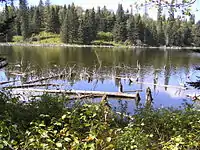| Type | Number | Area | % Land area | |
|---|---|---|---|---|
| Hectares | Acres | |||
| Provincial Parks | 94 | 4,679,278 | 11,562,750 | 7.12% |
| Wilderness Parks | 4 | 2,353,130 | 5,814,700 | 3.62% |
| Natural Parks | 18 | 1,053,641 | 2,603,600 | 1.62% |
| Heritage Parks | 8 | 231 | 570 | <0.01% |
| Recreation Parks | 51 | 3,249 | 8,030 | <0.01% |
| Park Reserves | 13 | 1,269,027 | 3,135,830 | 1.95% |
| Ecological Reserves | 30 | 79,767 | 197,110 | 0.12% |
| Total | 124 | 4,759,045 | 11,759,860 | 7.24% |
This list of protected areas of Manitoba groups the protected areas of Manitoba by the agency that is responsible for their protection.
National Protected Areas
| Part of a series on |
| Canadian wildlife |
|---|
 |
Two national parks, overseen by Parks Canada, have been established within Manitoba:
Riding Mountain National Park forms the core of the Riding Mountain Biosphere Reserve (RMBR), a UNESCO World Biosphere Reserve.[1]
Provincial Protected Areas
Manitoba has 92 provincial parks.[2] The provincial government has also established more than 50 protected areas under the Provincial Parks Act,[3] overseen by the Manitoba Department of Natural Resources and Northern Development (previously by Manitoba Conservation and Climate).[3][4][5] This legislation provides for parks to be dedicated for three purposes:[3]
(a) to conserve ecosystems and maintain biodiversity;
(b) to preserve unique and representative natural, cultural and heritage resources;
(c) to provide outdoor recreational and educational opportunities and experiences in a natural setting.
Accordingly, the legislation distinguishes several types of park, and each provincial park must be classified as one of these types: Wilderness, Natural, Recreation, Heritage, and "any other type of provincial park that may be specified in the regulation." Land being considered for inclusion in a Provincial Park may be designated as a 'park reserve' for a limited period of time.[3]
Other legislation provides the government with additional opportunities to set aside areas of the province for special protection
- The Forest Act includes the ability to establish provincial forests, as well as prohibiting logging in provincial parks.[6]
- The Ecological Reserves Act includes the ability to establish ecological reserves.[7]
- The Wildlife Act includes the ability to establish Wildlife Management Areas (WMA)[8]
- The East Side Traditional Lands Planning and Special Protected Areas Act, which governs the traditional use for the area east of Lake Winnipeg.[9]
There is also a series of lands privately owned by three conservation agencies that are part of the provincial protected areas network.
| Name | Area | Est'd |
|---|---|---|
| Amisk Park Reserve | 198,000 ha (490,000 acres) | 1994 |
| Birch Island Park Reserve | 79,000 ha (200,000 acres) | 2000 |
| Chitek Lake Park Reserve | 100,300 ha (248,000 acres) | 1999 |
| Fisher Bay Park Reserve | 84,150 ha (207,900 acres) | 2000 |
| Goose Islands Park Reserve | 145 ha (360 acres) | 2001 |
| Grand Island Park Reserve | 1,035 ha (2,560 acres) | 2001 |
| Kinwow Bay Park Reserve | 8,400 ha (21,000 acres) | 2001 |
| Little Limestone Lake Park Reserve | 4,095 ha (10,120 acres) | 2007 |
| Pelican Islands Park Reserve | 600 ha (1,500 acres) | 2001 |
| Pemmican Island Park Reserve | 22 ha (54 acres) | 2001 |
| Poplar-Nanowin Rivers Park Reserve | 777,270 ha (1,920,700 acres) | 1999 |
| Name |
|---|
| Asatiwisipe Aki Traditional Use Planning Area |
| Ni-Kes Traditional Use Planning Area |
| Pauingassi Traditional Use Planning Area |
| Pimitotah Traditional Use Planning Area |
Regional/urban parks
There are several large local/regional parks in the City of Winnipeg, which are the responsibility of the municipal Department of Public Works.[11][12]
| Name[11][13] | City area |
|---|---|
| Air Force Heritage Museum and Air Park | West - St. James |
| Assiniboine Forest | West - Charleswood |
| Assiniboine Park | West - Assiniboia |
| Bruce Park | West - St. James |
| Buhler Recreation Park | East |
| Bunn's Creek Centennial Park | North - North Kildonan |
| Central Park | Center - Downtown |
| Crescent Drive Park | South |
| Fraser's Grove Park | North - North Kildonan |
| John Blumberg Park | North |
| Kilcona Park | East - Transcona |
| Kildonan Park | North - West Kildonan |
| King's Park | South - Fort Garry |
| La Barriere Park | South |
| Little Mountain Park | Northwest |
| Living Prairie Museum (nature preserve) | |
| Maple Grove Park | South - St. Vital |
| Provencher Park | South - Saint Boniface |
| St. John's Park | North - North Point Douglas/North End |
| St. Vital Park | South - St. Vital |
| Stephen Juba Park | Center - Downtown |
| Vimy Ridge Memorial Park | Center - Downtown |
| Westview Park | West - St. James |
| Whittier Park | South - Saint Boniface |
Other local parks in Manitoba include:
- Mystery Mountain Winter Park — a small ski park in Mystery Lake.
- International Peace Garden — a park located adjacent to the International Peace Garden Border Crossing between Manitoba and the U.S. state of North Dakota.
- Morden Research Station — an arboretum in Morden.
- Prairie Sentinels Park — a public park located in the centre of Deloraine.
- Stonewall Quarry Park — a park in the town of Stonewall.
See also
References
- ↑ "Riding Mountain". Ecological Sciences for Sustainable Development. United Nations Educational, Scientific and Cultural Organization. Retrieved 10 July 2017.
- ↑ Climate, Conservation ans. "Parks and Protected Spaces | Conservation and Climate | Province of Manitoba". www.gov.mb.ca. Retrieved 18 June 2021.
- 1 2 3 4 The Provincial Parks Act, C.C.S.M. c. P20 (enacted by SM 1993, c. 39). Retrieved 2023-05-22.
- ↑ Natural Resources and Northern Development. "Parks and Protected Spaces". www.gov.mb.ca. Retrieved 22 May 2023.
- ↑ "Parks and Protected Spaces". Conservation and Climate. Retrieved 18 June 2021.
- ↑ The Forest Act, C.C.S.M. c. F150. Retrieved 2023-05-22.
- ↑ The Ecological Reserves Act, C.C.S.M. c. E5. Retrieved 2023-05-22.
- ↑ The Wildlife Act, C.C.S.M. c. W130. Retrieved 2023-05-22.
- ↑ The East Side Traditional Lands Planning and Special Protected Areas Act, C.C.S.M. c. E3. Retrieved 2023-05-22.
- ↑ "Manitoba's Network of Protected Areas – by Type". Government of Manitoba. Retrieved 4 August 2016.
- 1 2 Public Works. "Parks." winnipeg.ca. Retrieved 2023-05-22.
- ↑ "Winnipeg Parks". parkmaps.winnipeg.ca. Retrieved 18 June 2021.
- ↑ "New Parks Projects - Parks and Open Space - Public Works". City of Winnipeg. Retrieved 18 June 2021.
External links
- "A System Plan for Manitoba's Provincial Parks" (PDF). Government of Manitoba. March 2008. Retrieved 4 August 2016.
- "Alphabetical listing of parks in Manitoba". Government of Manitoba. Retrieved 4 August 2016.
- Government of Manitoba Parks and Protected Spaces Branch

